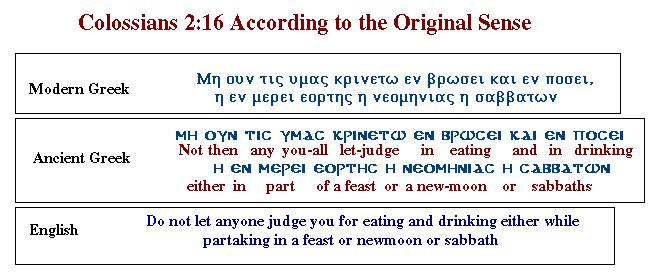|
|
|
|

1. The usual mistranslations are
in essence, "Do not let anyone jugde you in eating or in drinking,
or in respect of a new moon, holy day, or sabbath."
The Nestle-Aland Greek text (21st Edition) reads, "eating and in drinking"
(![]() ),
rather than the "meat, or in drink" of the King James Version. The
key difference is the Greek word
),
rather than the "meat, or in drink" of the King James Version. The
key difference is the Greek word ![]() which means "and" rather then the Greek word
which means "and" rather then the Greek word ![]() which means "or" when used to coordinate two elements of a clause.
When this fact is observed, it then becomes evident that the normal method
of translating the remaining eta's (
which means "or" when used to coordinate two elements of a clause.
When this fact is observed, it then becomes evident that the normal method
of translating the remaining eta's (![]() )
in the verse can be followed and make good sense. Observe the Greek
text and see the sequence
)
in the verse can be followed and make good sense. Observe the Greek
text and see the sequence ![]() ...
... ![]() ...
... ![]() within the verse. According to Liddell and Scott, this
sequence is to be translated "either ... or ... or". Thayer's Lexicon
and BAG also state the same.
within the verse. According to Liddell and Scott, this
sequence is to be translated "either ... or ... or". Thayer's Lexicon
and BAG also state the same.
2. An "ascetic" practices
"ascetism," which is basically religious self denial, "Touch no; taste
not; handle not" (Colossians 2:21). An ascetic indulges in "neglecting
of the body" (Colossians 2:23) for what he thinks are religious duties
to God, but which are really, "commandments and doctrines of men" (Colossians
2:22).
4. The Bauer, Arndt, and Gingrich
entry is [1b], "![]() -
-![]() either-or Mt. 6:24; 12:33; Lk 16:13.
either-or Mt. 6:24; 12:33; Lk 16:13. ![]() -
-![]() -
-![]() either-or-or (Philod.,
either-or-or (Philod., ![]() .
col. 22, 41 Jensen) 1 Cor. 14:6 (
.
col. 22, 41 Jensen) 1 Cor. 14:6 (![]() four times as Libanius, Or. 28 p. 48, 15 F., Or. 31 p. 130,7) ...."
four times as Libanius, Or. 28 p. 48, 15 F., Or. 31 p. 130,7) ...."
All Rights Reserved.
Send us email.
www.parsimony.org